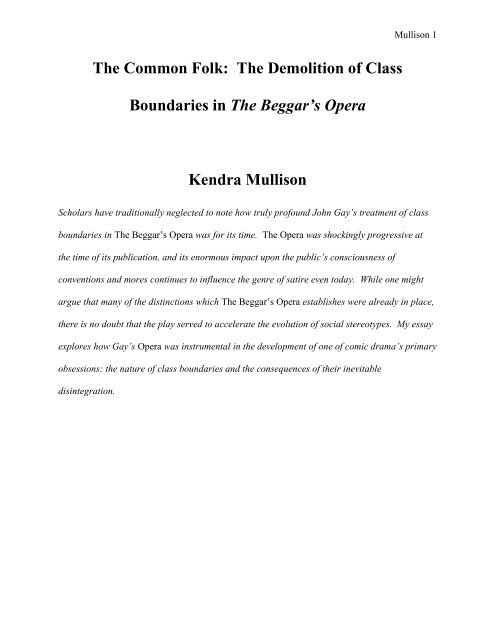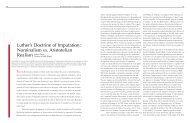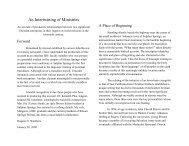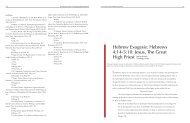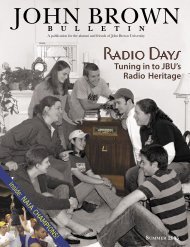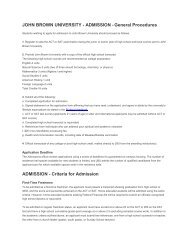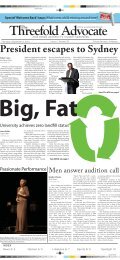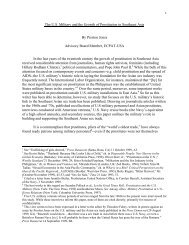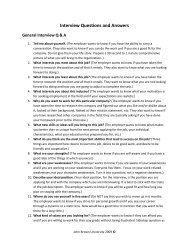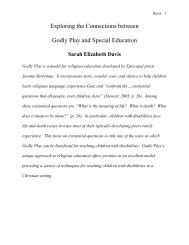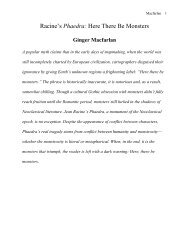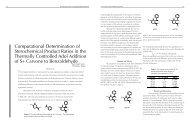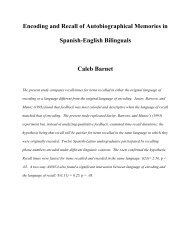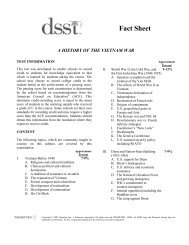Kendra Mullison - John Brown University
Kendra Mullison - John Brown University
Kendra Mullison - John Brown University
You also want an ePaper? Increase the reach of your titles
YUMPU automatically turns print PDFs into web optimized ePapers that Google loves.
<strong>Mullison</strong> 1The Common Folk: The Demolition of ClassBoundaries in The Beggar’s Opera<strong>Kendra</strong> <strong>Mullison</strong>Scholars have traditionally neglected to note how truly profound <strong>John</strong> Gay’s treatment of classboundaries in The Beggar‟s Opera was for its time. The Opera was shockingly progressive atthe time of its publication, and its enormous impact upon the public’s consciousness ofconventions and mores continues to influence the genre of satire even today. While one mightargue that many of the distinctions which The Beggar‟s Opera establishes were already in place,there is no doubt that the play served to accelerate the evolution of social stereotypes. My essayexplores how Gay’s Opera was instrumental in the development of one of comic drama’s primaryobsessions: the nature of class boundaries and the consequences of their inevitabledisintegration.
<strong>Mullison</strong> 2<strong>John</strong> Gay‟s treatment of class boundaries in The Beggar’s Opera was shockinglyprogressive at the time of its publication, and its impact upon the public‟s understanding of itselfwas nothing short of revolutionary. While one might argue that many of the distinctions whichThe Beggar’s Opera establishes had already been in place—albeit unnamed—for some time,there is no doubt that the play served to accelerate the evolution of social stereotypes. Gay‟sOpera was instrumental in the development of one of comic drama‟s primary obsessions: thenature of class boundaries and the consequences of their inevitable disintegration.In his Opera, Gay deliberately turns stereotypical eighteenth-century treatments ofeconomic and gender-based class structures upside-down. Gay‟s middle-class background andinsignificant social rank ensure his empathy with the struggles and values of the common folk,and in The Beggar’s Opera, he pays homage to his origins. His is in, as Dianne Dugaw writes,“the ironically self-aware, yet evasive and vulnerable position of the onlooking outsider” (53),and his dissociation from the political body allows him the distance necessary for a trulyobjective analysis of its mechanics. His unique perspective empowers him to recognize thestrengths and weaknesses of both the lower and upper classes, and to develop “what we call„cultural forms‟ […] to express and mark stratifying categories in a socioeconomic system ofstriving individuals. These forms include not only what is now designated as class identity, butalso race, gender, and sexual orientation” (Dugaw 21). Highwaymen become gentlemen, andgentlemen become thieves; aristocrats and beggars alike become equal in vice, and womenbecome dynamic, emancipated decision-makers.Despite Gay‟s initial fears, The Beggar’s Opera was an unexpected—and raging—success with its audience. Nevertheless, the play received mixed reviews and accusations ofsedition, and the government officially suppressed its successor, Polly. Gay did, after all, make
<strong>Mullison</strong> 3implicit comparisons between the vices of his characters and those of key political figures, andeven Prime Minister Robert Walpole not excluded. The Opera‟s tone is harsh, and as such itdiverges greatly from its far more gentle predecessors. Gay disregards specific political jargon:the terms Whig and Tory remain noticeably absent since he wishes to appeal to neither party.The Beggar’s Opera was not, as Samuel <strong>John</strong>son and others have claimed, “plainly written onlyto divert, without any moral purpose” (qtd. in Winton 107). It does not lack a moral; Gay‟s aimis not to target a specific social group, but rather to appeal to all. Rather, Gay‟s message is astarkly Christian one, and meant to be universally applied: humanity is depraved, rich and pooralike. He conveys this message through pointed satire and an unparalleled use of lyric verse.According to <strong>John</strong> Adrian, “The Beggar’s Opera […] though delightful to audiences,[was] more satirical than anything Gay had written” previously (47). In addition, the Opera isextraordinarily experimental: even in its very structure and form, Gay‟s integration of ballad,folk tradition, and elegant diction is groundbreaking. Yet, if critics were unsure how to accept itsunforgiving social commentary and extensive artistic liberties at the time, The Beggar’s Operawas in good company. In point of fact, the play is just one part of a much larger movement ofliterature characterized by “social satire, political satire, and literary burlesque” (Winton 91).This movement is born out of and driven by a deep concern over the state of the nation and thecorruption of its governing body. Gay published The Beggar’s Opera just as his friend andfellow-writer “[Alexander] Pope was combining the same ingredients […] in the first version ofThe Dunciad, and as Swift had recently done in Gulliver’s Travels” (91). Gay‟s Opera is uniqueamong its reformatory contemporaries, however, in its prevailing depiction of the degenerativeeffect of social vice, a vice which Gay considers the common disease of all classes.
<strong>Mullison</strong> 4While differences in social status were certainly recognized long before Gay publishedThe Beggar’s Opera in 1728, the modern concept of distinct socio-economic and gender-basedclasses was slow to develop. The idea that one‟s identity was wrapped up in one‟s place insociety was, however, slowly coming to the public‟s attention. Dugaw writes that the “satires of<strong>John</strong> Gay both use and reveal a waking fixation on cultural markers of social rank,” apreoccupation that was founded in the emerging “capitalist order of markets, money, and tradeon which The Beggar’s Opera fixes our attention” (19-20). The rise of the bourgeois classcoincided with an increase in public concern over the threat that the newly monied social bracketposed to positions inherited from antiquity. There is no apparent evidence that Gay is in any wayprejudiced for or against the bourgeois; rather, he chooses to avoid focusing on wealth andinstead to question the manner in which individuals seek to define their identities. One mustnote, however, that even as Gay sets a precedent in defining the demarcations between socialclasses, he often establishes distinctions only in order to demolish them. He attempts to showhow society is just as much a unified whole as it is made up of diverse individual parts.The characters, regardless of socio-economic position, are united by a common fixation:their desire for financial gratification. As J. Douglas Canfield writes, Gay establishes a tangiblelink between corrupted lower classes, and the equally diseased aristocratic elite in theirwholehearted pursuit of money:Despite all their rhetoric, Macheath and his gang are all motivated by thisprinciple [greed], as, despite their ladylike pretensions, are all the whores. And,of course, the major satirical implication of the play is that, despite all theirpretensions, so are the government, the clergy, the lawyers, the merchants—all ofBritish society, [and] all of the bourgeois audiences of the play. (324)
<strong>Mullison</strong> 5Gay spares no class; his scathing disapproval of capitalism and the selfishness it inspires ispervasively evident throughout the entirety of The Beggar’s Opera, and is applied to paupers andaristocrats alike. Despite their vastly different social positions, both Polly‟s father, the doublecrossingPeachum, and her husband, the unfaithful Macheath, are motivated by the same selfishdesire for money. Peachum‟s very career is built around self-interested betrayal, and the playopens with his bartering of human destinies for his own personal profit.Peachum‟s character closely resembles that of the historic figure, Jonathan Wild, a manwhose criminal empire was so organized that he had “licensed the thieves and pickpockets intogangs and assigned them strictly to districts or occasions […]; he had warehouses for the receiptof stolen goods […] and his own ship to carry them if necessary” (Noble 6). His claim that “Alawyer is an honest employment; so is mine” (Gay 418) is immediately undermined, not only byhis profession, but also by his decision to betray one of his followers to the authorities. Heassigns a value to human life, and betrays his underling, Tom Gagg, to the authorities for a mereforty pounds (419). Peachum‟s greed extends to his private family life also, and his prospects forhis daughter‟s marriage are based purely on the financial benefit, and he encourages her “tomake the most of her beauty” (422). Despite his position as a respected member of thebourgeois, Peachum lives a life enslaved to vice.On a superficial level, Macheath‟s character is a slight improvement over his employer‟s;however, as Madeline Smith Atkins explains, “Highborn or common, the raffish characters inGay‟s ballad opera were all cast from the same mold: they were miscreants, who poked fun atsociety‟s shortcomings” (viii). Macheath, despite possessing pseudo-gentlemanlycharacteristics, is in many ways merely a reflection of Peachum. One might claim that, even asPolly is his daughter by blood, Macheath the product of Peachum‟s empire and his son by trade.
<strong>Mullison</strong> 6For Macheath, a fondness for women goes hand-in-hand with a love for money, and his claimthat “a man who loves money might be as well contented with one guinea as I with one woman”is emblematic of his amorous—and exploitative—lifestyle (435). Just like Peachum, Macheath‟sgreed manifests in his objectification of women, and both men treat them as tradablecommodities, pleasures able to be bought or gained through sham marriages. In essence, Gay‟sliberal application of greed as a universal vice levels all individuals of every social stratum, maleand female, rich and poor.Despite an excessive number of character defects, however, Macheath is portrayed withsympathy and feeling. His personality is undeniably dissolute, decadent, and immoral; however,it is his very humanity, manifested in and through his vices, that lends him such interest as acharacter. With Macheath, more than with any other character in The Beggar’s Opera, Gayachieves a fine balance between depravity and nobility. Even his fellow thief, Matt of the Mint,affirms Macheath‟s courage, claiming that “[his fellows had] all been witnesses of it” (434);Macheath himself claims to have been free from “the least marks of avarice or injustice” in thehandling of their affairs (434). Even the irascible Mrs. Peachum, along with all of the women ofMacheath‟s acquaintance, is inclined to find him “cheerful and agreeable” (421), without a rivalin the superficial appearance of gentlemanly behavior. That he is a highwayman is, without adoubt, essential to his character, yet Macheath is not defined by his career any more than Lockitand Peachum are defined by theirs. He is, at the very core, a man—a man who appeals to thehuman sensibility and love of fellowship. One might even say that Macheath is the prototypicalman, embodying every characteristic that society considers fundamental to human nature.According to Yvonne Noble, such an excess of “vigor and good nature does Gay give his rustics,or Londoners, that in [Macheath] the literary measurement becomes reciprocal: it begins to
<strong>Mullison</strong> 7dignify the characters” (2). Because of Gay distinguishes his characters from the common mobby paying attention to the minutiae of human existence. Because of “his interest in their customsand the small details of their worlds,” the burlesque Opera becomes a “celebration” of a flawedhumanity (2). Macheath doesn‟t fit neatly into any stereotype or class structure, and the richnessand complexity of his personality lends, rather than detracts, from his general appeal. CliffordGeertz writes that he becomes “a cultural figure against a social ground [ . . . ] an expressiveform [ . . . that ] provides a metasocial commentary upon the whole matter of assorting humanbeings into fixed hierarchical ranks” (qtd. in Dugaw 19). Macheath‟s ability to transcend socialboundaries—even those demarcations defined by <strong>John</strong> Gay himself—challenges the reader‟sdependency on stereotypes to frame and understand his character. Gay intentionally defiesexplanation, and summons his readers to pay closer attention to the conflicts of interest thatcharacterize human behavior throughout all time, and in every station of life.In The Beggar’s Opera, Gay does not shy away from targeting and reevaluating thefunction of individuals from every social class, and his treatment of women is no exception. Hedoes not attempt to restrict women to the classic model of obedient, dutiful, and demuredaughters and wives. Instead, he presents his readers with a new class of woman in theemancipated, self-driven, and self-aware Polly Peachum. It is Polly who provides the exceptionto almost every eighteenth-century standard imposed upon women in her circumstances. In themidst of a culture that objectifies women, Polly stands out as a striking example of the selfactualizedwoman. She marries Macheath against the will of her parents, defies them when theychallenge her choice, faces her husband‟s many former lovers with dignity, and is eventuallyrewarded for her perseverance by the liberation of and her reunification with her rakish-yet-
<strong>Mullison</strong> 8charming husband. Despite her father‟s desire for her to marry with “her own profit” in mind(422), Polly chooses love—or at least passion—over practicality.Polly‟s character rejects both her filial and marital duties. In addition to her defiance ofher parents, she chooses not to sacrifice her personal interests for her beloved; instead, sheemploys her feminine wiles to secure Macheath‟s affection, allowing him “trifling liberties” onlyin order to lure him into a longstanding relationship (424). Gay goes so far as to classify womenas habitual manipulators, and Polly‟s claim that all women instinctively “[know] how to bemercenary … We have it in our natures” (424) casts doubt not only upon the virtuosity of heractions, but upon the behavior of all women. In Polly, Gay‟s sequel to The Beggar’s Opera, thetitle heroine crosses the final frontier of gender boundaries when she both dresses and fights as aman. Despite these unconventionally aggressive actions, Polly retains her female sexuality, andher feminine charms garner her much attention from the men around her. Cheryl Wanko arguesthat “Polly's exaggerated lasciviousness does not produce a grotesque portrait” of moraltransgression (487). Instead, Polly provides “a humorous caricature of a sexual woman”—ahuman, realistic woman—in a play “in which lustful whores and predatory thieves provoke notfear but laughter” according to the author‟s design (487). In the end, few characters rival thecomplexity of Polly Peachum in word and action. By presenting a female character of suchdynamic personality to his audience, Gay dispenses with eighteenth-century stereotypes ofwomen; instead of a virtuous Madonna or a predatory Eve, Gay allows that women may be bothinnocent and sexual, weak in spirit and yet powerful in influence, simple and complex.The monumental impact of <strong>John</strong> Gay‟s The Beggar’s Opera may be traced through thehistory of drama to the present day. His witty dialogues and commentaries upon the socialhierarchy provide remarkable insights into both eighteenth-century stereotypes, and the ways in
<strong>Mullison</strong> 9which Gay seeks to transcend them through his unique conceptualizations of Peachum,Macheath, Polly, and various other characters. Gay‟s satire serves not only to denounce therampant criminal activity of his age, but also to highlight the corruption of the governing bodythat perpetuated it. His criticism is not mere mockery, but is aimed rather at transforming hisculture by exposing the workings of a system that not only allowed, but also encouraged,corruption on all levels. He provides the general public with sometimes problematic, yetbelievably authentic, portraits—portraits that embody the virtues and the vices shared by allindividuals in all classes of eighteenth-century British society.


